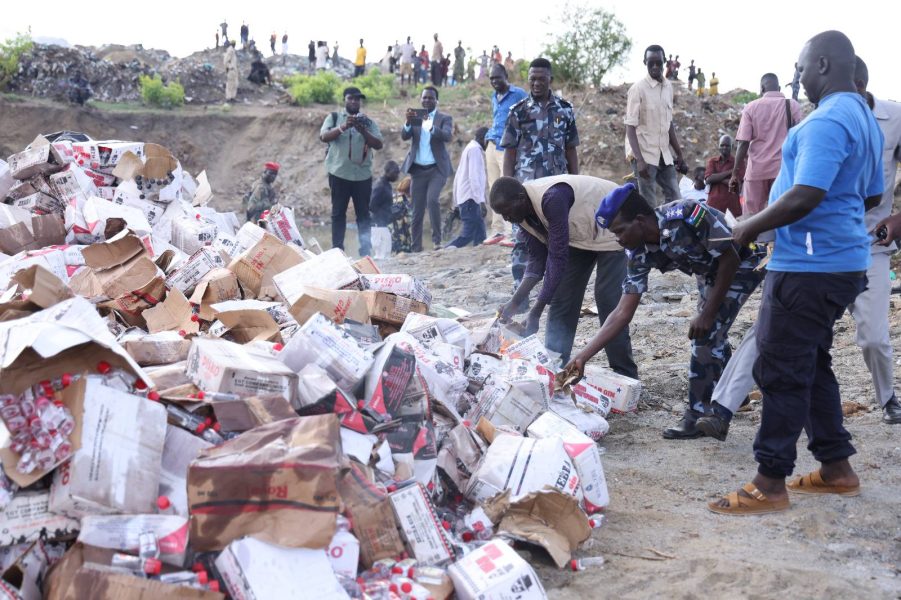
Central Equatoria State government has intensified its fight against illicit alcohol, recently seizing and destroying large quantities of spirits known locally as ‘Jana FAR.’
As part of enforcing a gubernatorial order prohibiting production and sale of such drinks, this action has generated debate and mixed reactions among Juba residents on effectiveness of the exercise.
‘Jana FAR,’ a term commonly used to describe a strong, cheap spirit alcohol like Royal Gin, is widely consumed in Central Equatoria State, including by children.
While many residents applaud the government’s decision as an important step towards protecting young people, others are skeptical about how long authorities will continue to enforce the order.
This recent crackdown isn’t the first attempt to ban the dangerous drink. In 2022, the sale of such harmful liquor in residential areas was also banned by former Juba City Council Mayor Michael Thomas Allah-Jabu. In 2023, then-Governor Emmanuel Adil issued a state-wide ban on alcohol sales. Now, the current Governor, Augustino Jadalla, is pushing forward with renewed enforcement.
Earlier this week, demonstrating their commitment to implement the ban, the state government conducted confiscation operations across different parts of Juba County. The collected spirit alcohol was destroyed.
Speaking at the destruction site, Juba County Commissioner Emmanuel Tete Ezbon urged leaders in other counties to replicate the efforts.
“We are calling on all county commissioners in Central Equatoria to enforce these measures,” he said. “All shops and bars must adhere strictly to the directive.”
Officials have confirmed plans for similar operations to continue across the state in coming weeks, to confiscate, prosecute, and destroy illegal products.

Authorities in Juba oversee the destruction of confiscated alcoholic spirits through incineration, as part of ongoing efforts to enforce alcohol regulations. (Courtesy Photo)
However, this swift move has generated diverse opinions among the public.
In interviews conducted by this reporter, residents are questioning whether the ban will truly be effective in curbing the sale of Jana FAR, especially considering how widely the banned alcohol has become in local markets and shops in residential areas.
Mary Kiden, a resident of Gumbo, who has witnessed children as young as 14 consuming alcohol, said the implementation of the order was long overdue.
“This alcohol has been killing our children,” she says. “It is everywhere, and young people are getting hooked on it. I am happy something is finally being done about it.”
“I have seen children as young as 14 drinking this alcohol and it’s heart-breaking,” Kiden said.
However, the path to effective prohibition faces challenges, mainly enforcement of the ban and how deeply the sale of Jana FAR has been integrated into markets.
Peter Ladu, a shopkeeper at Konyo Konyo market, is one of the sceptics.
“People will always find a way to get what they want,” he says, shaking his head. “I don’t think this ban will work unless there’s real enforcement. It’s easy to say, but hard to stop the sale of alcohol in such a busy market.”
Amina Ibrahim, who runs a small shop at the Custom market, shares similar concerns. “We depend on these sales for our daily bread,” she says.
“If the authorities don’t provide us with alternatives, many of us will struggle to make ends meet. We need to think about the impact on people’s livelihoods, not just the alcohol itself.”
Despite uncertainties surrounding the enforcement of the order, many residents see the ban as a positive step towards addressing the ‘Jena FAR’ menace.
It is yet to be seen if this latest government effort can truly reduce the harm caused by ‘Jana FAR,’ or if the trade will merely be driven further underground.

